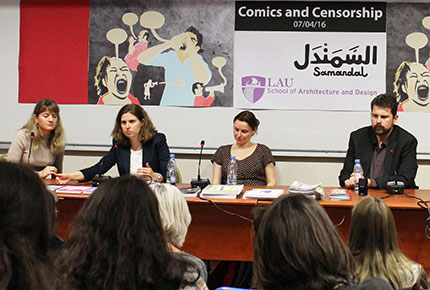To sketch or not to sketch: LAU talks comics and censorship
LAU’s Department of Graphic Design brings together national and international experts to discuss the sensitive issue of comics, freedom of speach and censorship.
An enthusiastic audience filled the lecture hall at the Adnan Kassar School of Business at LAU Beirut on April 7, where the School of Architecture and Design held a panel discussion about comics and censorship. Lebanese laws on freedom of speech and expression are ambiguous, with several cases over the past few years increasing public debate about the issue. These include the recent case of Samandal, a popular satirical Lebanese comic book series that addresses various social and political issues.
In 2010, the publication’s editors were sued by the Lebanese state for “inciting sectarian strife” and “denigrating religion”.
It was therefore fitting that Samandal co-founder Lena Merhej kicked off the event and later moderated the open discussion panel.
Charles Brownstein — a tenacious advocate for free speech and chair of the U.S. – based Banned Books Week Coalition — opened his talk with a warning: “I’m going to show you some upsetting images.” Illustrating his argument with PowerPoint projections, Brownstein discussed how the right to free speech and expression guaranteed by the U.S. Constitution’s First Amendment has been infringed through the court system against comic book artists whose work was deemed “too obscene” by the state. He pleaded passionately for total free speech: “Freedom of speech allows you to compete in the marketplace of ideas.”
Is it possible for comic book artists to sidestep censorship? Irina Chiaburu, who earned her Ph.D. from Jacobs University (Bremen) and whose research focuses on censorship in the Soviet Union under the Brezhnev government, says “yes.” She discussed how the slow opening of an autocratic Soviet society led to what could best be described as a quagmire for both censors and artists alike. She concluded that censorship inspired artists to convey their messages more creatively: “In countries where people endure censorship, people read between the lines.”
Finally, Lebanese legal expert Rana Saghieh, who supported Samandal during their legal battle, focused her attention on the inconsistencies and misuse of censorship laws in Lebanon. She cited examples of Lebanese who have been prosecuted under the criminal code for satirical art and social media posts, a situation that has lead to the “worst effect” of widespread self-censorship. Still, she ended on a positive note: in her view, although Samandal was ultimately fined $20,000, Sabiegh believes that the controversial case “opened a wider public discourse on art and censorship.”
The symposium concluded with a heated and an engaging open discussion that focused on the acceptable limits to free speech, with audience members citing potential security issues like the Charlie Hebdo attacks in Paris. In the end, it appears that the issue of free speech and expression is of great concern to not only artists, but to many others in Lebanon. Perhaps Merhej’s standout guiding question should spearhead future discussions: “Do we really believe in free speech?”
More
Latest Stories
- LAU Family Medicine Graduates to Benefit from a Partnership With Nova Scotia
- AKSOB Assistant Professor Shares Her Vision for the Future of Learning
- LAU Simulation Models Celebrate 20 Years of Learning, Leadership and Service
- The School of Engineering Hosts the Lebanese Electromagnetics Day
- LAU Stands Out on the Sustainability Scores
- Michael Haddad Walks Again for Climate Change and Food Security
- AI in Clinical Practice: Tools, Ethics, and the Human Touch
- Interior Design Students Honor the Past by Designing the Future


